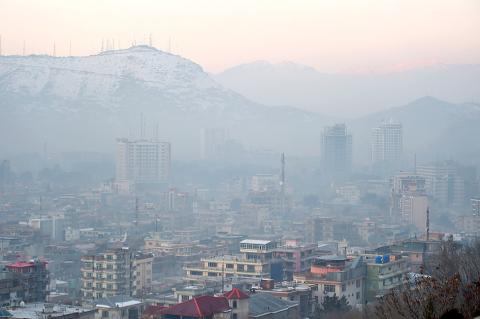Kabul residents have long run the gauntlet of suicide attacks and bombs. However, this winter, they face another deadly threat: air pollution.
For weeks a thick layer of toxic smog has blanketed the sprawling city as cold air traps pollution caused by people burning coal, wood, tires and even garbage to stay warm.
The choking contamination peaks in evenings and early mornings when temperatures plunge below zero. Dangerous particulate matter, including toxins like sulphate and black carbon, hang in the air like a thick curtain, reducing visibility and making breathing difficult.

Photo: AFP
Residents complain the air is getting worse — a view supported by doctors who report a sharp rise in respiratory illnesses.
“In previous years 30 to 40 percent of our patients were suffering from acute respiratory infections, but this year it has jumped to 70 or 80 percent,” said Akbar Iqbal, a doctor in the intensive care unit (ICU) of the Indira Gandhi children’s hospital in Kabul.
“I believe the cold and pollution are the main causes,” he said.
HEALTH RISKS
A seasonal lack of rain and snow in Kabul, coupled with a fast-growing population, fume-belching vehicles and proliferation of diesel-fueled generators, is contributing to the deteriorating air quality.
A former official at the Afghan National Environmental Protection Agency (NEPA) described this winter’s pollution as “deadly.”
“This can cause stunting and mental development problems in children as well as miscarriages and can lead to many forms of cancer,” said Abdul Hadi Zhemen, who until recently was the spokesman for NEPA.
Kabul’s air pollution exceeds the WHO’s safe levels on any given day in winter. Recently, the city of 5 million people has ranked among the most polluted in the world, according to the AirVisual network.
The air quality index reading is often above 300, while at night it can top 600. Recent snow and rain offered some respite, but readings still remain well above the WHO’s limits.
Any reading over 100 is considered unhealthy.
Long-term exposure to air pollution can cause strokes, heart disease, lung cancer and respiratory illnesses, the WHO said.
Authorities have turned to media to educate people on air pollution and encourage the use of face masks, even though they often provide poor protection.
“On the most polluted days we advise people to stay indoors... when the pollution level is at its highest,” said Mohammad Kazem Homayoun, NEPA’s chief for Kabul.
APPROACHING CRISIS
In a country where most people are illiterate and healthcare is limited, the information is unlikely to help many.
Doctors are also falling victim to the toxic air.
Sohrab Noori, head of the ICU at Wazir Akbar Khan hospital — where the number of admissions for respiratory-related problems has increased — said he had developed a “winter cough” for the first time.
“I think it’s an allergic reaction to the air pollution,” Noori said as he walked past patients hooked up to oxygen cylinders.
“If it [air pollution] continues in the long term, in two to three months we might have a big health crisis,” he said.

Airlines in Australia, Hong Kong, India, Malaysia and Singapore yesterday canceled flights to and from the Indonesian island of Bali, after a nearby volcano catapulted an ash tower into the sky. Australia’s Jetstar, Qantas and Virgin Australia all grounded flights after Mount Lewotobi Laki-Laki on Flores island spewed a 9km tower a day earlier. Malaysia Airlines, AirAsia, India’s IndiGo and Singapore’s Scoot also listed flights as canceled. “Volcanic ash poses a significant threat to safe operations of the aircraft in the vicinity of volcanic clouds,” AirAsia said as it announced several cancelations. Multiple eruptions from the 1,703m twin-peaked volcano in

Chinese President Xi Jinping (習近平) launched a week-long diplomatic blitz of South America on Thursday by inaugurating a massive deep-water port in Peru, a US$1.3 billion investment by Beijing as it seeks to expand trade and influence on the continent. With China’s demand for agricultural goods and metals from Latin America growing, Xi will participate in the APEC summit in Lima then head to the Group of 20 summit in Rio de Janeiro next week, where he will also make a state visit to Brazil. Xi and Peruvian President Dina Boluarte participated on Thursday by video link in the opening

‘CHINA HAWKS’: Rubio and Michael Waltz, who is said to be next national security adviser, view Beijing as a threat and challenge to US economic and military might US president-elect Donald Trump on Monday announced new members of his incoming administration and was expected to pick US Senator Marco Rubio as secretary of state. Rubio and US Representative Michael Waltz, who has been lined up for the powerful US national security adviser role, have notably hawkish views on China, which they see as a threat and challenge to US economic and military might. The two appointees, both from Florida, would be key architects of Trump’s “America First” foreign policy, with the incoming president having promised to end the wars raging in Ukraine and the Middle East, and avoid any more

HOPEFUL FOR PEACE: Zelenskiy said that the war would ‘end sooner’ with Trump and that Ukraine must do all it can to ensure the fighting ends next year Russia’s state-owned gas company Gazprom early yesterday suspended gas deliveries via Ukraine, Vienna-based utility OMV said, in a development that signals a fast-approaching end of Moscow’s last gas flows to Europe. Russia’s oldest gas-export route to Europe, a pipeline dating back to Soviet days via Ukraine, is set to shut at the end of this year. Ukraine has said it would not extend the transit agreement with Russian state-owned Gazprom to deprive Russia of profits that Kyiv says help to finance the war against it. Moscow’s suspension of gas for Austria, the main receiver of gas via Ukraine, means Russia now only